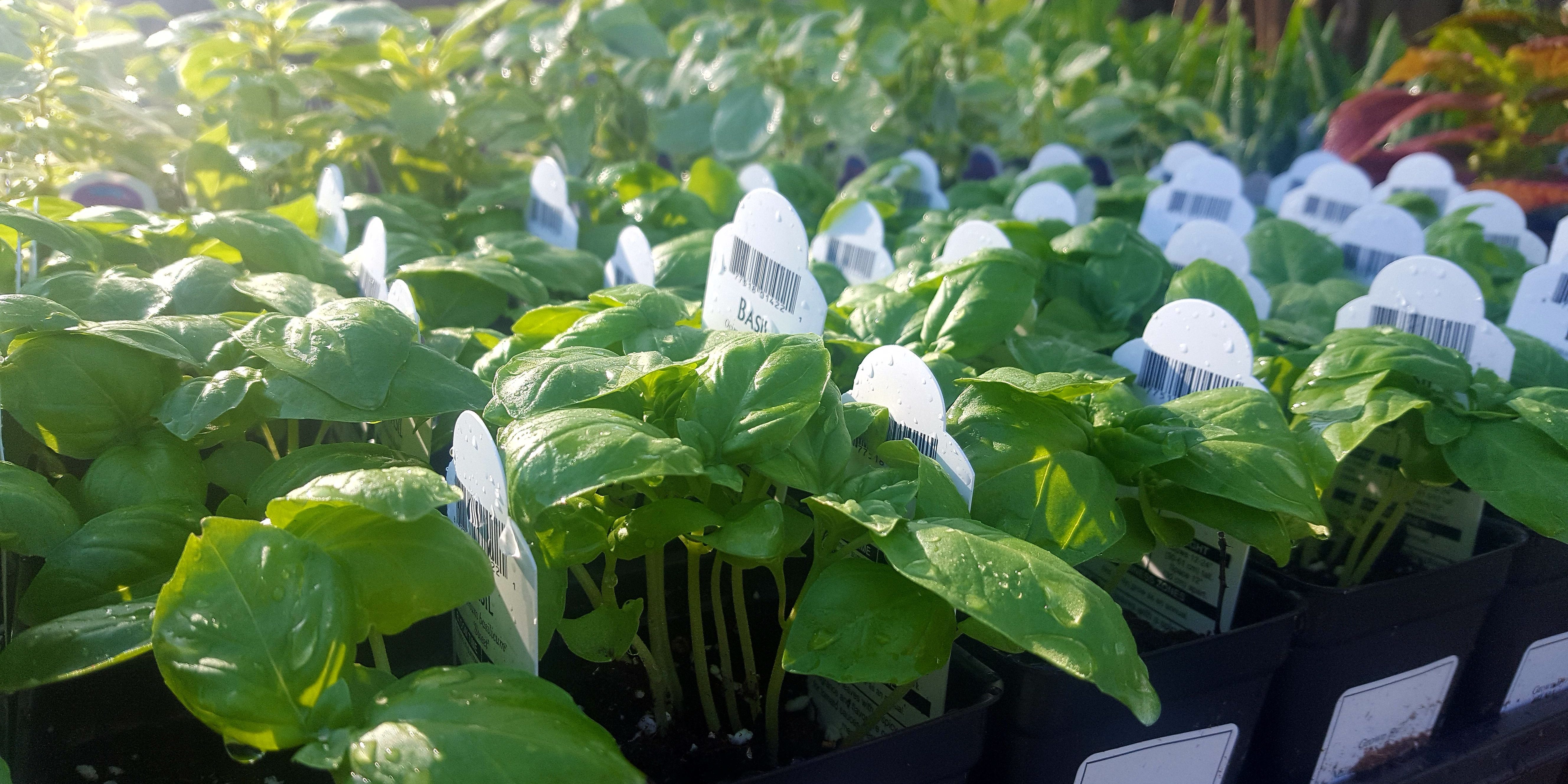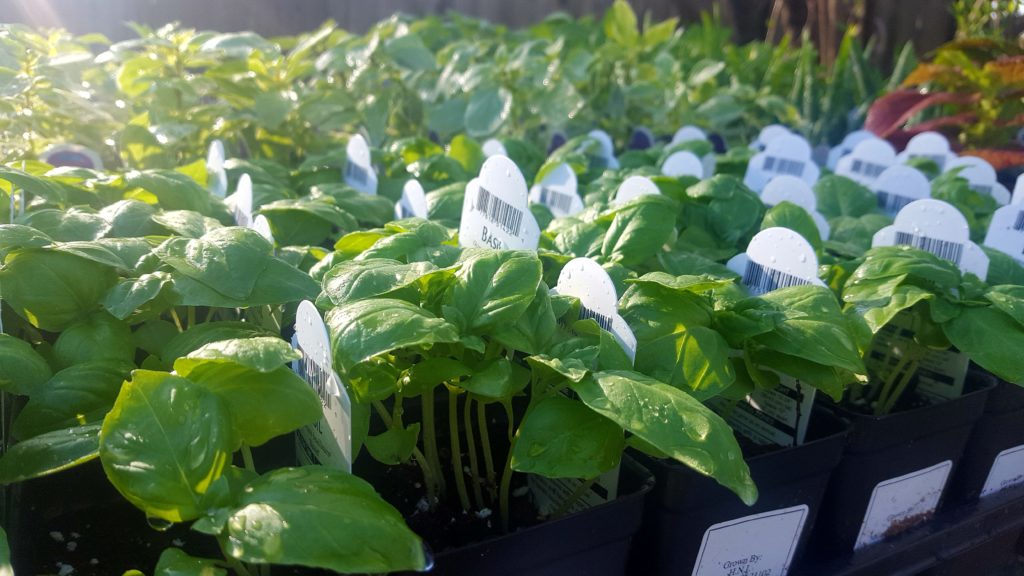The live plants have arrived at Smile! With dozens of herbs to choose from, the variety can be overwhelming. If you’re looking to grow herbs at home but aren’t sure where to begin, here are our top 3 picks for the easiest herbs to grow with the most crossover health benefits.
These 3 favorites taste great and are excellent for cooking, tea blends, and treating a wide range of common health problems. Making these herbs part of your daily life will nurture health for body and soul.
Our 3 herbs are members of the mint family Lamiaceae. Mints are some of the easiest, most forgiving herbs to grow, so they’re great for all experience levels. If you’ve got a sunny spot to plant in the ground, fantastic, but these herbs will grow happily in pots as well. With a good potting mix, a sunny window (or a CFL lightbulb), and regular watering, you’ll be all set with three solid herbs for good health at home.
Holy Basil (Tulsi)
Ocimum sanctum
Holy Basil is one of the most revered healing plants in our pharmacopeia and the most sacred plant in Indian medicine. It is traditional to have a tulsi plant in every Indian household.
Tulsi is a powerful adaptogen for stress. In the short term, it provides relief for mental stress, digestive upset, and physical tension. Over time, it rebuilds adrenal reserves, immune strength, and emotional resiliency. It keeps blood sugar in balance and aids in meditation, healthy sleep patterns, and balanced body weight. Having a tulsi plant around fills the room with a beautiful aroma that is also antimicrobial and cleansing to the air.
Like Italian basil, tulsi is excellent for headaches of all kinds, boosting circulation to the brain and increasing memory and cognitive function. Some herbalists and yogis place a tulsi leaf on the tongue to aid meditation and calm the mind, not to mention enjoy the lovely flavor.
Current research is exploring tulsi’s role in anti-radiation therapy. All in all, this is a tremendous plant to have in your home or garden. It is an annual herb, but it produces copious amounts of seeds that you can save, replant, and share with friends and family. The beautiful, purple, aromatic flowers can be eaten for a spicy snack or left alone to produce seeds. Tulsi can replace Italian basil in many recipes, including pesto.
Tulsi likes full to partial sun, well-drained soil, and regular watering.
Peppermint
Mentha piperita
Peppermint is a perfect beginners herb and a real treat to have in the kitchen, summer or winter. In the summer, this invigorating and refreshing herb is a perfect ingredient for cooling tea blends or mint juleps. Peppermint tea drunk cold in the summer is wonderfully refreshing, uplifting, and healing to the digestive tract.
In the winter, peppermint’s immune-boosting essential oil content makes it a powerful (and tasty) ally for preventing colds and treating infections. It clears excess mucous from the respiratory and digestive tracts while promoting clear thinking and good mood.
Peppermint is probably best known for being a powerful digestive herb. It “wakes up” the digestive system and dispels excess gas and mucous. Peppermint is warming and anti-inflammatory at the same time, one of its unique gifts. It soothes and heals the entire intestinal tract while encouraging the flow of digestive juices. It is wonderful for upset stomach in adults and children, especially in cases of gas, nausea, and griping pains.
Peppermint relaxes the muscles and soothes tension and spasms. Inhaling the essential oil lifts the spirits, disinfects the respiratory tract, and promotes strong memory retention. Peppermint tea or leaves can be taken to improve the memory while studying for tests or taking exams.
Peppermint enjoys full to partial sun, well-drained soil, and regular watering. This is a perennial herb that will come back year after year. Cut sprigs of mint will root in water or soil, so it’s easy to share with friends and family. If you’re planting outdoors, the lovely flower spikes are a favorite for bees and other beneficial pollinators.
Oregano
Origanum vulgare
Oregano is great to have around for cooking, but it’s also one of the best cold remedies available. Oregano is rich in antimicrobial essential oils that prevent infections of all kinds, internally and externally. If you’ve got an oregano plant in the kitchen, you can be sure that your next respiratory infection will be much less painful and much shorter lived.
Oregano oil is well-known for cleansing, disinfecting, and clearing out the respiratory system. It also increases circulation to the digestive system, providing a gentle warming stimulant to the system.
Oregano is a perennial herb that enjoys well-drained soil, full sun, and moderate watering. Like peppermint, sprigs of oregano will root for easy propagation. The beautiful flower spires are beloved by pollinators of all kinds.
Antimicrobial oregano, peppermint, and tulsi can all be used in recipes for house-cleaning materials, and they also dry beautifully for smudging and incense.
These three herbs are excellent for beginners, but of course there are many wonderful and easy-to-grow plants to choose from, including one of our all-time favorite herbs, Lemon Balm. Come by the shop and see which plants speak to you!









